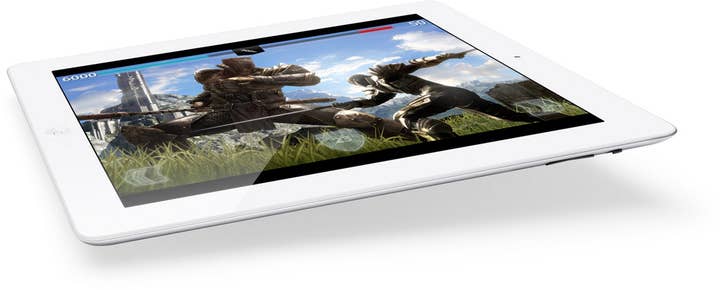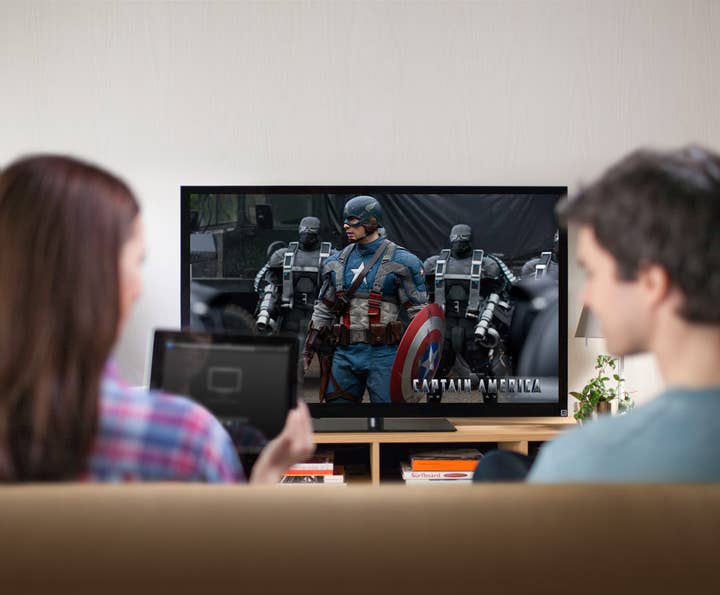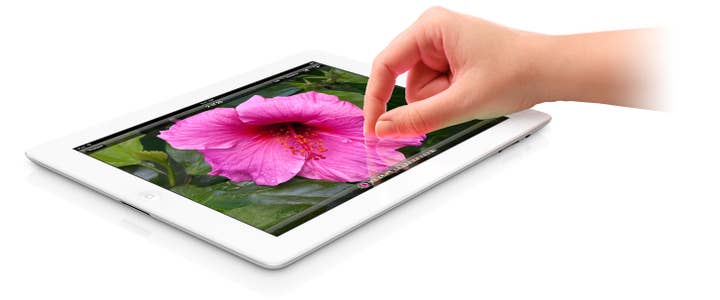iPad: Apple's Trojan Horse
Apple's readying for the next console war with its new iPad
The new iPad looks much like the old iPad, until you turn it on. Then you see the razor-sharp clarity of the 2048 x 1536 screen, gleaming with more resolution than a 1080p HDTV. Don't be lulled into complacency by the beauty of the display. There's an army being created because of this new screen, and it's awaiting the signal to come forth and do battle in the next console war.
The first step in Apple's strategy has begun simply by making the 2048 x 1536 resolution the new standard for the iPad. The first reaction of game developers to this new high-resolution screen is that they will be creating a high-res version of their game as soon as they reasonably can. It's usually not a difficult process; some developers (ones who have been listening to the rumors) have been preparing their original artwork in higher resolution for months. Already, some of the key games like Infinity Blade II have appeared with high-resolution versions. Many more games are on the way; every publisher will want to take advantage of the higher resolution, if for no other reason than to produce gorgeous screen shots of their games. A few months from now, it seems like a safe bet that there will be hundreds of games for the new iPad with high-resolution graphics. By the end of the year, it will be thousands of games.
Why is this significant? Let's look at another piece of Apple's strategy for a clue. If you look on Apple's web site, the new Apple TV is listed as an iPad accessory. The new Apple TV can now handle full 1080p output for movies, and with AirPlay or through a cable your new iPad's output can be routed to your HDTV. All of those games that are soon to be in high-resolution will look excellent on your HDTV. The strategy is coming into focus now, isn't it?
"Gamers have learned to live with and enjoy FPS games on consoles, despite the apparent controller limitations. The same thing may well happen with tablet games"
Put this together with the persistent rumor that Apple is planning to release an 'iTV' - an Apple HDTV with some special features (perhaps Siri integration), which would doubtless include a version of the App Store. Probably at that same time, the stand-alone Apple TV box would gain the App Store as well. (Or maybe a newer version of the Apple TV hardware, if they feel the need to upgrade the processor.) Instantly, thousands of free or low cost games will be available in the living room. All of those games that were upgraded to better than HD resolution for the new iPad will be ready to be delivered right to your new iTV (or Apple TV plus your current HDTV). This neatly gets around the problem that most new hardware platforms have, that of limited software at launch. Usually it takes months to get a significant number of games for a new platform, if not years. Apple will have hundreds or thousands of HD apps when their new platform launches.
Now you can see the soldiers pouring out of Apple's Trojan Horse, assaulting the current rulers of the living room, the console makers. Apple's games will be just as good-looking to the casual eye as console games. No, they won't have the in-depth, immersive gameplay of the best console titles. Not at first, anyway. The limitation that you need to download the iOS games will keep them from becoming 25 gigabyte behemoths. That's just a temporary limitation; some of which can be sidestepped by clever design. For instance, large intro animations and cut scenes often take up gigabytes of space on disc; those can easily be streamed instead of waiting for a download. Massive content can be doled out in chunks if the design is tweaked to allow for that; intelligent downloading in the background can help, too.

The controllers... how can you have good games without great controls? "Playing first-person-shooters just doesn't work on a tablet, you don't get the great control you have on a console!" goes the argument from a hardcore gamer. True, as far as it goes. It's interesting to note that this is the same argument that PC gamers threw at console gamers many years ago. "Consoles may be OK for kiddie games, but real games are played on a PC," went the party line. The FPS game was purely a PC game... until Halo arrived. Even then, it was clear that the combination of a mouse and a keyboard was far superior for controlling an FPS. Microsoft toyed with the idea of allowing Xbox Halo players to play against the (then recently-released) PC version of Halo. They ran some tests, and quickly found that even mediocre Halo PC players mopped up the best Xbox Halo players without breaking a sweat. Plans to cross-connect the PC and console game audiences were quietly shelved.
Yet, here we are, with gamers having learned to live with and enjoy FPS games on consoles, despite the apparent controller limitations. The same thing may well happen with tablet games. The tablet itself can be used as a controller if the main game screen is being sent to your HDTV. Certainly, tablets and smartphones as controllers have certain advantages; they have lots of sensors, touch screens, can provide hidden information easily... and you can add a Bluetooth controller that looks a lot like a standard console controller, or for that matter a Bluetooth keyboard if you want to get closer to a PC interface for games. (Easy keyboard availability onscreen on tablets also makes typical MMORPGs much more interesting than they are on consoles.)
"We are seeing the beginning of the next console war now, even before E3 when Nintendo will introduce the Wii U and hopefully reveal key details of its features"
While you're thinking about Apple's assault on the living room, don't forget that Google is working towards the very same goal with Google TV. While the platform has yet to get much traction, Google is by no means finished with their attempt to gain a foothold in the living room. Google's acquisition of Motorola gives it a significant set-top box business, and Google is no doubt trying to cut deals with cable companies to include Google TV functionality in future set-top boxes. For that matter, almost all TV manufacturers are making the most of their new TVs Internet-connected with apps, and some with streaming-game services such as Gaikai or OnLive built in.
Is it any wonder that Microsoft and Sony want to take more time to figure out their next generation console strategy? Microsoft has plans for Windows 8, with a unifying interface that works across smartphones, tablets, computers, and the Xbox. Sony also has a full lineup of phones, tablets, computers and a dedicated handheld console as well as the PS3. Notice that Microsoft is pushing Xbox Live across all its platforms, and Sony is spreading the Sony Entertainment Network (which includes the PlayStation Network) across all of its devices, too.

The battle is going to be fought not just with hardware, but with entire ecosystems. The hardware platform merely enables the delivery of games, music, video, and other media as well as apps. The market opportunity is 10 to 100 times larger than the console market, if the smartphone and tablet markets are any indicators.
Notice too that many of the competitors are aiming for low price points rather than sheer power at any cost. The current Apple TV is $99, and Google TV as a separate box is likely to be the same. Building the functionality into TVs means the cost will tend to disappear as fierce competition keeps prices low. Amazon has found great success with their Kindle Fire tablet by keeping the price at $199 so they can sell their digital media; they could easily do a version of the Kindle for a TV set.
Not surprisingly, we've heard rumors that Microsoft may have more than one new console, perhaps a relatively inexpensive one with fewer features and one more expensive aimed at core gamers. Maybe it's as simple as just taking the existing Xbox 360 and slimming it down more and reducing the cost further. Sony may well want to consider a similar path; they have been very successfully selling PlayStation 2 hardware long after the PlayStation 3 appeared.
We are seeing the beginning of the next console war now, even before E3 when Nintendo will introduce the Wii U and hopefully reveal key details of its features, introduction date, and pricing. When it launches later this year, Nintendo will perhaps have a dozen or more titles shipping for it. With Apple's inevitable launch of an app store in the living room, they will have hundreds or perhaps thousands of titles due to the new iPad's high-res screen. The Trojan Horse is moving into position, with estimates of more than 60 million units to be sold this year, and even more next year. The next console war will be an epic battle indeed.

